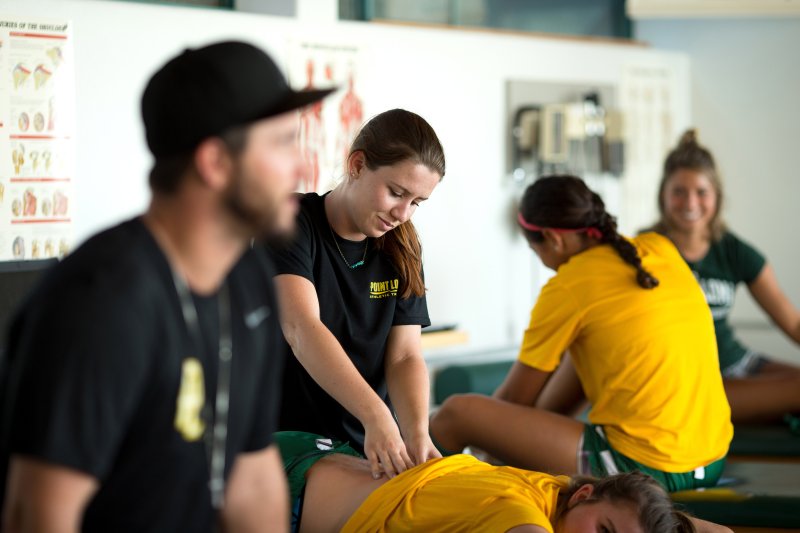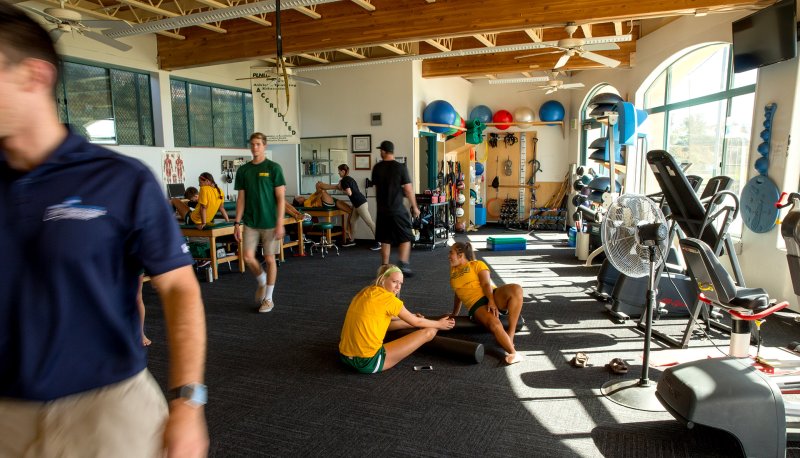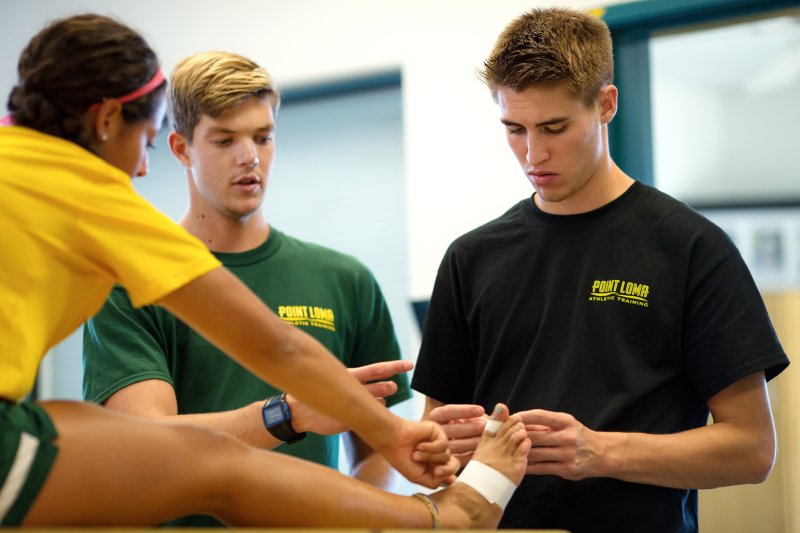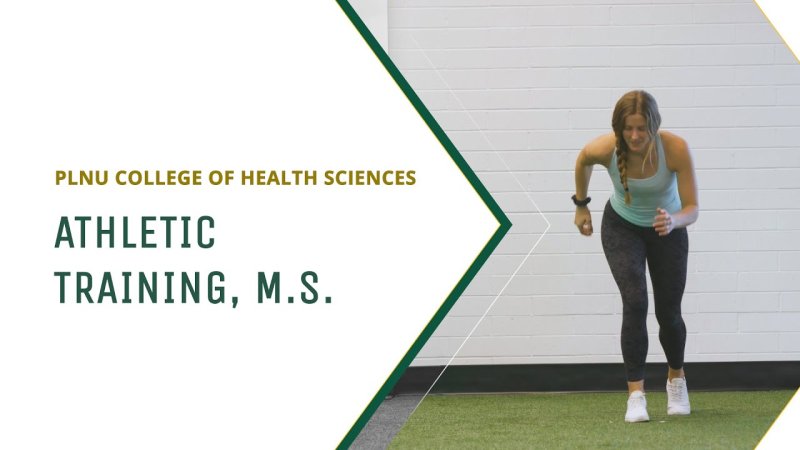
The Athletic Training Clinic at Point Loma Nazarene University is a state-of-the-art facility where students receive the clinical experience they need to become successful athletic trainers (ATs).
Picture yourself working alongside professional ATs, receiving personalized feedback, and treating patients with the latest research and equipment. This can be your experience at PLNU.
What is Athletic Training?
Athletic trainers are high-demand professionals who make a difference in the lives of others. ATs are healthcare professionals who help prevent, diagnose, treat, and rehabilitate injuries among athletes. Since athletic training is a hands-on career, it makes sense to pursue a hands-on education. At PLNU, clinical experiences, personal mentorship, and a deep understanding of the human body are hallmarks of the athletic training program. Point Loma’s onsite athletic training clinic is one important part of a larger group of clinical experiences within the AT program.
__________
Experience life-changing education
Pursue your purpose at PLNU.
__________
What are the Benefits of Learning in an Athletic Training Clinic?
PLNU’s athletic training clinic and other clinical sites are where you will have the chance to put your studies into practice while receiving the mentorship you need to develop as an AT.
Each clinical site where PLNU students work offers the opportunity to learn about and contribute to athletes’ training, treatment, and recovery. AT clinics offer treatment tables, taping tables, and rehabilitation facilities. Each site allows AT students to evaluate and treat athletes, create and administer rehabilitation programs, complete patient documentation, and be involved in coaches’ meetings. The hallmark of the clinical component is the chance to work with clinical preceptors.
Clinical preceptors are certified athletic trainers who are willing to educate students. Every student is assigned to a preceptor. Your preceptor will help you hone your clinical skills, giving you constructive evaluations and personalized feedback. You will see teams and travel with your preceptor.
At Point Loma’s on-campus clinic, you will also sit in on doctors’ and chiropractors’ clinics. These opportunities prepare you to understand and work with other professionals in caring for your future athletes.

Should I Choose a School With Its Own Athletic Training Center?
A crucial part of any AT program is clinical experience. By the time you graduate from PLNU with your athletic training degree, you will have experience helping athletes at different ages and levels. You will also have spent time working with medical professionals to understand rehabilitation, disease, and illness.
At PLNU, a well-equipped onsite clinic is one place you can gain clinical experience. Students also do clinical rotations at other sites, including athletic training clinics at other local universities of various sizes. PLNU’s faculty will determine the best placements for you based on your goals and experience.
PLNU athletic training students also complete three five-week rotations in surgery; general medicine, where you will learn about illness as well as injury and when to refer a patient elsewhere; and one in physical therapy, where you will see how PTs work with not only athletes but the elderly, those injured at work, and even pediatric patients with conditions such as cerebral palsy.
What Else Makes a Great Athletic Training Program?
Athletic trainers need to understand the human body in both broad and deep ways. A strong program emphasizes fundamental knowledge of the body and gives you many opportunities to grow in both knowledge and practice. Your experience can be deepened by choosing a program that offers strong mentorship and values.
Program depth and breadth
Every athletic training major at PLNU begins their program with a gross anatomy course that involves dissecting a human cadaver. This unique experience helps students to understand the human body in ways lectures or computer simulations can’t. As you see muscles and the body up close, you gain a greater understanding of form and function.
“To us, it’s foundational that the students not only understand anatomy but have a really good appreciation for the human body and the gift of the human body,” said program director Nicole Cosby, Ph.D., ATC.
In addition, choosing a program like Point Loma’s that focuses on evidence-based learning and applying research to practice is key if you want to be ready to provide athletes the best quality care.
Mentorship
Caring and engaged clinical preceptors make a big difference in program quality -- so do faculty.
“Every faculty member that teaches in our athletic training program has experience practicing as a clinician,” said Cosby. “They have done research, and they have a passion for teaching. It allows us to prepare [you] for the clinical setting and the exam.”
Mentorship is a big reason PLNU’s graduates have a first-time pass rate of 92% on the national Board of Certification exam, according to Cosby.
Values and Calling
Cosby also pointed out the difference it makes to learn among people who put their purpose and passion at the center of what they do. That kind of atmosphere breeds a feeling of connection – of family – among students and faculty.
“We are intentional about integrating faith into our curriculum and what it looks like to be a servant,” she said, “not just because you are in the service industry but because that is a part of your calling. It’s a part of what we wake up to do.”

How Can I Become an Athletic Trainer?
To become an athletic trainer, you will need to obtain a master’s degree in athletic training and pass the national Board of Certification (BOC) exam. Bachelor’s level-only programs are currently being phased out, so choosing a program with a master’s degree will help prepare you best. At PLNU, you can enter the athletic training program either as a first-time undergraduate freshman, earning your bachelor’s and master’s degrees in five years, or as a graduate student if you already hold a B.A., in which case you can earn a master’s degree in two years.
